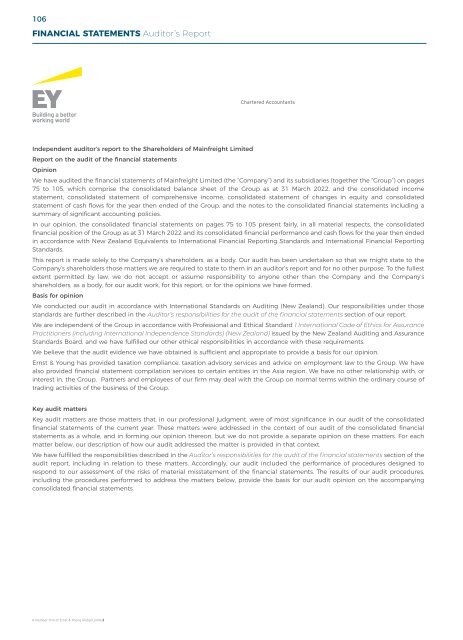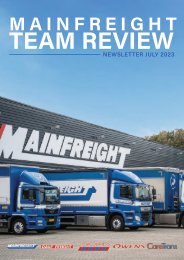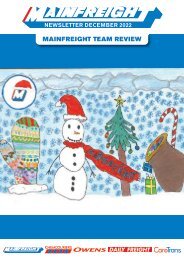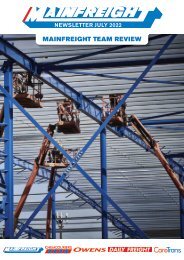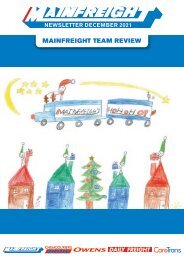Mainfreight Annual Report 2022
Mainfreight Annual Report 2022
Mainfreight Annual Report 2022
- No tags were found...
Create successful ePaper yourself
Turn your PDF publications into a flip-book with our unique Google optimized e-Paper software.
106 107<br />
FINANCIAL STATEMENTS Auditor’s <strong>Report</strong><br />
FINANCIAL STATEMENTS Auditor’s <strong>Report</strong><br />
Independent auditor’s report to the Shareholders of <strong>Mainfreight</strong> Limited<br />
<strong>Report</strong> on the audit of the financial statements<br />
Opinion<br />
We have audited the financial statements of <strong>Mainfreight</strong> Limited (the “Company”) and its subsidiaries (together the “Group”) on pages<br />
75 to 105, which comprise the consolidated balance sheet of the Group as at 31 March <strong>2022</strong>, and the consolidated income<br />
statement, consolidated statement of comprehensive income, consolidated statement of changes in equity and consolidated<br />
statement of cash flows for the year then ended of the Group, and the notes to the consolidated financial statements including a<br />
summary of significant accounting policies.<br />
In our opinion, the consolidated financial statements on pages 75 to 105 present fairly, in all material respects, the consolidated<br />
financial position of the Group as at 31 March <strong>2022</strong> and its consolidated financial performance and cash flows for the year then ended<br />
in accordance with New Zealand Equivalents to International Financial <strong>Report</strong>ing Standards and International Financial <strong>Report</strong>ing<br />
Standards.<br />
This report is made solely to the Company’s shareholders, as a body. Our audit has been undertaken so that we might state to the<br />
Company’s shareholders those matters we are required to state to them in an auditor’s report and for no other purpose. To the fullest<br />
extent permitted by law, we do not accept or assume responsibility to anyone other than the Company and the Company’s<br />
shareholders, as a body, for our audit work, for this report, or for the opinions we have formed.<br />
Basis for opinion<br />
We conducted our audit in accordance with International Standards on Auditing (New Zealand). Our responsibilities under those<br />
standards are further described in the Auditor’s responsibilities for the audit of the financial statements section of our report.<br />
We are independent of the Group in accordance with Professional and Ethical Standard 1 International Code of Ethics for Assurance<br />
Practitioners (including International Independence Standards) (New Zealand) issued by the New Zealand Auditing and Assurance<br />
Standards Board, and we have fulfilled our other ethical responsibilities in accordance with these requirements.<br />
We believe that the audit evidence we have obtained is sufficient and appropriate to provide a basis for our opinion.<br />
Ernst & Young has provided taxation compliance, taxation advisory services and advice on employment law to the Group. We have<br />
also provided financial statement compilation services to certain entities in the Asia region. We have no other relationship with, or<br />
interest in, the Group. Partners and employees of our firm may deal with the Group on normal terms within the ordinary course of<br />
trading activities of the business of the Group.<br />
Key audit matters<br />
Key audit matters are those matters that, in our professional judgment, were of most significance in our audit of the consolidated<br />
financial statements of the current year. These matters were addressed in the context of our audit of the consolidated financial<br />
statements as a whole, and in forming our opinion thereon, but we do not provide a separate opinion on these matters. For each<br />
matter below, our description of how our audit addressed the matter is provided in that context.<br />
We have fulfilled the responsibilities described in the Auditor’s responsibilities for the audit of the financial statements section of the<br />
audit report, including in relation to these matters. Accordingly, our audit included the performance of procedures designed to<br />
respond to our assessment of the risks of material misstatement of the financial statements. The results of our audit procedures,<br />
including the procedures performed to address the matters below, provide the basis for our audit opinion on the accompanying<br />
consolidated financial statements.<br />
Component Oversight<br />
Why significant<br />
<strong>Mainfreight</strong> is a global business with approximately 78% of the<br />
Group’s revenue being generated in countries other than New<br />
Zealand.<br />
A significant area of focus when conducting the audit was<br />
assessing that sufficient audit evidence was obtained by each<br />
component audit team to enable us to reach our opinion on the<br />
consolidated financial statements as a whole. This was both with<br />
respect to the determination and allocation of materiality as well<br />
as the determination of the nature and extent of procedures to<br />
be performed by each component audit team.<br />
Revenue Recognition<br />
Why significant<br />
As disclosed in the Income Statement, the Group recognised<br />
revenue totalling $5.2 billion for the year.<br />
Under New Zealand equivalents to International Financial<br />
<strong>Report</strong>ing Standard 15: Revenue from Contracts with Customers<br />
(“NZ IFRS 15”), an entity must recognise revenue with respect to<br />
the performance obligations it has identified within its contracts<br />
with customers.<br />
<strong>Mainfreight</strong> has determined it meets performance obligations<br />
in its customer contracts over time. There is judgement involved<br />
in assessing the stage of completion and therefore the amount<br />
of revenue recognised. This is particularly relevant to the Air<br />
& Ocean Forwarding businesses for which delivery times are<br />
longer than for other revenue streams and the transactions are<br />
therefore more likely to span year end.<br />
The group bills for these services at different points in time<br />
depending on the nature of the service and makes adjustments<br />
to its underlying accounting records to record revenue in the<br />
correct period.<br />
Revenue recognition is a key audit matter as, collectively, material<br />
revenue transactions can occur close to year end and there is a<br />
risk that revenue is recognised in the incorrect period.<br />
How our audit addressed the key audit matter<br />
As Group auditor, EY New Zealand considered the nature, size and<br />
risks associated with each of the Group’s significant components.<br />
As a result of this assessment each component audit team was<br />
allocated a scope and materiality reflecting the business profile.<br />
The Group audit team communicated to the component audit<br />
teams about the significant risk areas to be considered and the<br />
information to be reported back to the Group audit team. The<br />
component and Group audit teams then determined the extent<br />
and nature of audit procedures to be performed in accordance<br />
with International Standard’s on Auditing (New Zealand).<br />
In order to obtain sufficient coverage of Group balances a<br />
number of smaller business units were subjected to analytical<br />
procedures by the Group audit team.<br />
All component teams were required to provide written<br />
confirmation to the Group audit team explaining the work<br />
performed, the results of that work as well any significant<br />
findings or observations.<br />
The Group held several discussions with <strong>Mainfreight</strong><br />
management and component teams in all significant non-New<br />
Zealand locations (Australia, USA, Europe and Asia). During these<br />
discussions, the work performed by each team was assessed,<br />
and the key judgements were discussed, as were the findings<br />
relevant to the Group audit.<br />
We reported to the Audit Committee;<br />
i) The results of audit procedures and testing performed by<br />
both the Group and component teams; and<br />
ii) Any misstatements identified that warrant reporting based<br />
on quantitative or qualitative grounds.<br />
How our audit addressed the key audit matter<br />
In obtaining sufficient audit evidence in respect of revenue<br />
recognised:<br />
• We evaluated the Group’s practices in respect of the timing<br />
of providing the service, timing of billing and when revenue<br />
is recognised.<br />
• We tested a sample of revenue transactions recorded near<br />
year end in accordance with NZ IFRS 15 to assess whether<br />
they were recorded in the correct period. This included<br />
considering shipping or other documentation indicating the<br />
timing of shipment.<br />
• At significant components we completed analytical<br />
procedures considering patterns of reported revenues and<br />
margins before and after year end.<br />
• We analysed credit notes issued after year end to assess<br />
whether these could significantly impact revenue recognised<br />
within the <strong>2022</strong> financial year.<br />
• We performed journal entry testing procedures with a focus<br />
on manual journal entries recognised within revenue near<br />
year end.<br />
• We also considered the adequacy of the disclosures in the<br />
consolidated financial statements.


